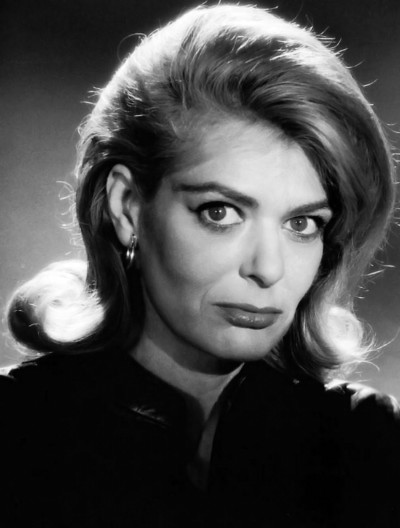Melina Mercouri (Maria Amalia Mercouri)

After her graduation, Mercouri joined the National Theatre of Greece and played the role of Electra in Eugene O’Neill’s play Mourning Becomes Electra in 1945. In 1949, she had her first major success in the theatre playing Blanche DuBois in A Streetcar Named Desire, written by Tennessee Williams and staged by Karolos Koun’s Art Theatre. Until 1950, she also worked in the same theatre in other plays by Aldous Huxley, Arthur Miller and André Roussin. She then moved to Paris, where she appeared in boulevard plays by Jacques Deval and Marcel Achard, and met famous French playwrights and novelists such as Jean Cocteau, Jean-Paul Sartre, Colette and Françoise Sagan. In 1953, she received the Marika Kotopouli Prize and returned to Greece two years later. At the Kotopouli-Rex Theatre, Mercouri starred in plays like Macbeth by William Shakespeare and L’Alouette by Jean Anouilh. Her first movie was the Greek language film Stella (1955), directed by Zorba the Greek director Michael Cacoyannis. The film received special praise at the 1956 Cannes Film Festival, where she met American film director Jules Dassin, with whom she would share not only her career but also her life. Their first professional pairing was 1957’s He Who Must Die. Other films by Dassin and featuring Mercouri followed, such as The Law (1959). She became well-known to international audiences when she starred in Never on Sunday (1960), in which Dassin was the director and co-star, and for which she earned the Best Actress Award at the 1960 Cannes Film Festival and was nominated for the Academy Award for Best Actress and the BAFTA Award for Best Actress in a Leading Role.
After her first major international success, she went on to star in Phaedra (1962), for which she was nominated again for the BAFTA Award and the Golden Globe Award for Best Actress in Motion Picture Drama. The recognition of her acting talent did not stop though, as her role in Topkapi (1964) granted her one more nomination, this time for the Golden Globe Award for Best Actress in Motion Picture Musical or Comedy. She worked with such directors as Joseph Losey, Vittorio De Sica, Ronald Neame, Carl Foreman, Norman Jewison, and starred in films like Spanish language The Uninhibited by Juan Antonio Bardem. She continued her stage career in the Greek production of Tennessee Williams’s Sweet Bird of Youth (1960), under the direction of Karolos Koun. In 1967, she played the leading role in Illya Darling (from 11 April 1967 to 13 January 1968) on Broadway, for which she was nominated for the Tony Award for Best Performance by a Leading Actress in a Musical, while her performance in Promise at Dawn (1970) earned her another Golden Globe Award nomination. On 8 October 1962, Mercouri appeared on the American TV show What’s My Line. After the panel were blindfolded, a strange man appeared on-stage and proclaimed himself “the second mystery guest”. Host John Charles Daly quickly called for “the relieving crew” and said “schedule two” (a code word used on live broadcasts in case of an emergency: the cameras are turned to a neutral position and the sound is cut off). The man talked a bit about a dating service he apparently owned before being hustled off the stage by announcer Johnny Olson and executive producer Gil Fates. Daly apologized to the panel and the program continued. Mercouri concentrated on her stage career for the following years, playing in the Greek productions of The Threepenny Opera and, for a second time, Sweet Bird of Youth, in addition to the ancient Greek tragedies Medea and Oresteia. She retired from film acting in 1978, when she played in her last film, A Dream of Passion, directed by her husband, Jules Dassin. Her last performance on stage was in the opera Pylades at the Athens Concert Hall in 1992, portraying Clytemnestra.
One of her first songs was by Manos Hadjidakis and Nikos Gatsos. It was titled Hartino to Fengaraki (“Papermoon”) and was a part of the Greek production of A Streetcar Named Desire in 1949, in which she starred as Blanche DuBois. The first official recording of this, now-legendary song was made by Nana Mouskouri in 1960, although the company Sirius, created by Manos Hadjidakis, issued, in 2004, a recording Melina had made for French television during the 1960s. Her recordings of “Athenes, ma Ville”, a collaboration with Vangelis, and “Melinaki”, were popular in France. Her recording of “Feggari mou, Agapi mou” (Phaedra) was quite popular and was later covered by Marinella in 1965. Mercouri died on 6 March 1994 at Memorial Sloan Kettering Cancer Center, New York City, from lung cancer, aged 73. She was survived by her husband, Jules Dassin. She had no children. She received a state funeral with Prime Minister’s honors at the First Cemetery of Athens four days later. The Melina Mercouri Foundation was founded by her widower.
Born
- October, 31, 1920
- Athens, Greece
Died
- March, 06, 1994
- USA
- New York, New York
Cause of Death
- lung cancer
Cemetery
- First Cemetery
- Athens, Greece



